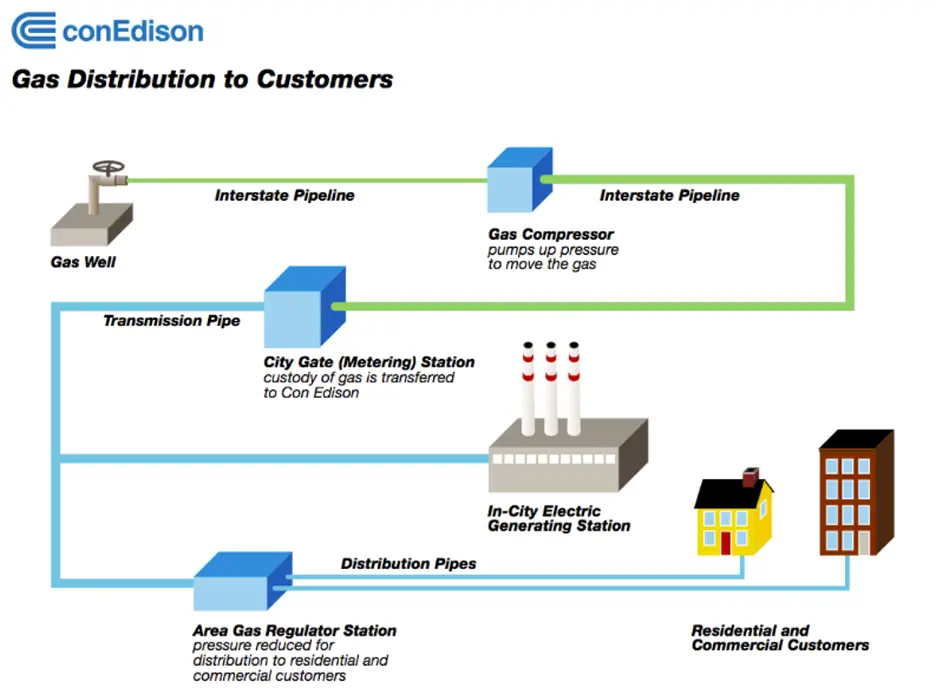Plans by Con Edison for a moratorium on new natural gas connections in Westchester County has raised concern among public officials who fear that a development boom in the county could be halted.
Con Edison announced on Jan. 18 that it would no longer accept applications for natural gas connections from new customers in southern Westchester, starting March 15. The company said it needs the moratorium to ensure it can meet current demand. Developers typically apply for gas hookups during the review stage, so the moratorium could dampen commercial building proposals.
“Without the ability to get gas for their heat, they cannot build,” Assemblywoman Amy Paulin said.
“I envision lawsuits,” the Scarsdale Democrat said. “And I envision, really our infrastructure in our entire county is in jeopardy.”
Yonkers Mayor Mike Spano said he is already hearing concerns. “The building boom in Yonkers seriously could be affected for as long as this moratorium lasts,” Spano said in a statement. “Developers are already telling us they can”™t build more housing or commercial buildings until this is resolved.”
Con Edison said the ban was precipitated by the fact that “all of this new demand for gas is reaching the limits of the current supplies to our service area.” That demand is driven both by homes converting from oil heating to natural gas and new buildings rising throughout the county.
 The ban affects the majority of Con Edison”™s service area in the county, with some exceptions in the northern part of its territory. Existing customers won”™t be affected. Con Ed delivers natural gas to 1.1 million customers in Manhattan, the Bronx, parts of Queens and most of Westchester County, which comes through interstate pipelines before being distributed.
The ban affects the majority of Con Edison”™s service area in the county, with some exceptions in the northern part of its territory. Existing customers won”™t be affected. Con Ed delivers natural gas to 1.1 million customers in Manhattan, the Bronx, parts of Queens and most of Westchester County, which comes through interstate pipelines before being distributed.
In a filing to the state Public Service Commission (PSC) in April, Con Edison said its natural gas demand on peak days increased by more than 30 percent between 2011 and 2017. It expects the peak demand to grow by an additional 23 percent during the next 20 years.
As regulators in Albany have mostly blocked new gas pipelines out of environmental concerns, the utility has explored and implemented “non-pipeline” alternatives. That includes demand-response, which offers financial incentives to consumers for limiting usage during peak times. Those efforts align with New York state policy aimed at reducing demand for natural gas and shifting to other heating sources, such as heat pumps.
James Denn, a spokesman for the PSC, pointed out that Con Edison has not proposed a pipeline to meet or address demand. He said the moratorium is “the result of a significant recent spike in demand for gas.”
“To help prospective customers meet their energy needs in light of these market dynamics, PSC will be monitoring Con Edison”™s engagement with customers to explore options to reduce their energy needs or meet their needs through non-natural gas energy sources,” Denn said.
Karl R. Rábago, executive director of the Pace Energy and Climate Center in White Plains, said that renewable heating options, such as ground source heat pumps, often outperform gas options in cost-benefit analyses. The Pace center works with the environmental law nonprofit EarthJustice to advocate for efforts that reduce gas demand and help cut down related emissions.
“I would be careful not to cast this into a dichotomy where either it”™s gas or the death of our economy,” Rábago said. “I don”™t think anyone is saying that and I don”™t think it is. We are in need of smarter systems.”
The Business Council of Westchester announced Jan. 22 that it would launch a campaign to seek solutions to end the moratorium.
“The supply crisis has been in the making for years as virtually any attempt to add major new natural gas capacity to the region has been either rejected or drowned out by calls for finding new alternative energy sources instead,” said BCW President and CEO Marsha Gordon. “All of us share in the desire to shift away from carbon fuels to renewable forms of energy. However, realistically, this is not going to happen overnight. In the meantime, natural gas is the best and least objectionable energy source and a plentiful supply is available.”
Patrick Lynch, president of OLA Consulting Engineers in Hawthorne, said natural gas is a popular choice for developers for its favorable costs and efficiency. His firm works with developers on designing HVAC, electrical and plumbing systems for their buildings.
Lynch said he was not sure if the ban will be a deal-breaker for developers on whether or not to build, but it will make a difference in choices about heating, though the factors in those decisions vary by developer.
Con Edison will still take applications up until March 15, but the company said it”™s possible that deadline could move up.
“Anyone we”™re working with ”” and I”™m sure other professionals will do the same ”” we are going to want to notify them to at least get your request in,” Lynch said.
Con Edison said the moratorium would last until it finds sufficient supply for new demand. “That can be through additional non-pipeline alternatives, or a pipeline project that meets federal and local requirements,” the company said.
County Executive George Latimer expressed his concerned about the proposed ban, saying, “We have requested a meeting with Con Edison officials and hope to bring to the table local, state and federal officials to discuss this matter. We need to understand what led to this moratorium, how the calculation for gas is made, how many customers exist in each municipality, which slated projects are in jeopardy, which are not, the duration of the moratorium, how that calculation was determined, an overview of the regulatory process, and Con Edison”™s plan for developing and implementing alternative energy sources.”
Seth Pinsky, executive vice president at RXR Realty, called the moratorium “yet another illustration of the price we are increasingly paying in the region for failing to invest in key infrastructure.” He said his company, which is master developer for downtown New Rochelle and is also developing new apartments in Yonkers, remains hopeful Con Edison and state and local officials can address the moratorium “before damage is done.”
“If this is resolved in a few weeks, it likely won”™t have a major impact,” he said. “If this is resolved in a few months, it might start to create issues. If this is resolved in a few years, it will be a big problem.”























Great news ! And any developer lead agency or land use board who states they are blindsided is not being truthful. Every public hearing on these massive developments brought these concerns but the so called leaders that be looked away. The current infrastructure of the lower Hudson Valley cannot support these massive developments..that is a FACT !
Yonkers, and others along the rivers, can get cheaper, cleaner cooling and heating by using the river as a both a source and sink of thermal energy (heat). The WTC building in NYC, downtown Toronto, the Cornell Campus and many other large developments near rivers use river water as a thermal resource for water-source heat pump systems. For those farther from the rivers, ConEd has proposed subsidizing the installation of over 8,000 geothermal heat pumps as well as air-source systems as alternatives to gas.
Existing gas users should be happy to see an end to gas expansion. Many of New York’s utilities have testified to the PSC that gas expansion is often “un-economic.” Thus, gas expansion often causes gas delivery rates to increase even though more gas is being sold! A permanent gas expansion moratorium would actually allow delivery rates to be reduced in the future since the rate base (undepreciated assets) would decline over time.
Also, gas users should be aware that even though State policy, such as efficiency and emissions goals, call for reduced gas use over the next 30 years (i.e. 80×50), the utility recovers its costs over 60 to 80 years. This means that gas users be paying for gas assets much longer than they will be using them! We’ll have what are called “Stranded Assets” that the remaining gas users will have to pay for. In order to reduce the accumulation of what will become stranded assets, we should reduce gas expansion today.
Responsible city and county leaders would be working to make the moratorium permanent and thus protect the existing users from future and dramatic gas delivery rate increases. At the same time, they should be working with ConEd and others to encourage “non-pipeline solutions,” like geothermal heat pumps, as the better solution for those who are now using dirty, expensive oil heat.